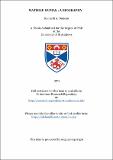Mathieu Dumas : a biography
Abstract
In a career spanning nearly seven decades, Mathieu Dumas served France as either a soldier or a legislator under each successive government from Louis XV to Louis-Philippe. Born in 1753, he entered the infantry in 1773 as a sous-lieutenant. Although lacking a personal fortune and the backing of family influence, Dumas' energy and ability combined with the support of two powerful patrons, Castries and Puységur, gained him relatively rapid promotion. By 1789 he had served in America as an aide-de-camp to Rochambeau and had been appointed to replace Guibert as rapporteur to the Council of War. Drawn into the politics of the Revolution through his association with the, liberal nobility, principally Lafayette and the Lameths, Dumas became the parliamentary leader of the Feuillant party in the Legislative Assembly, a major critic of the war and one of Lafayette's most courageous defenders. However, he also worked to improve the French army and aided in the deference of Paris during the Prussian invasion. With the end of the Assembly, Dumas sought to serve 'the Republic, but public suspicion forced him to flee to Switzerland. There Dumas, Brémond and Theodore Lameth met with the British agent Wickham to discuss their plan for the restoration of the Constitution of 1791, but not of the émigrés. The Thermidorian Reaction led to Dumas' return to France and to his re-entry into politics as a deputy in the Council of Elders under the Directory. The leader of a revived Feuillant party, Dumas pursued a moderate policy, preferring the gradual repeal of revolutionary legislation and cooperation with the Directory to the restoration of an unreconciled Louis XVIII. Proscribed on 18 Fructidor V, he went to Hamburg and remained there, working on what was to become his magnum opus, the Précis des Événemens Militaires, until Bonaparte's seizure of power. Despite his mistrust of Dumas' political opinions, Napoleon could not overlook his administrative ability and he employed him in high positions throughout the Consulate and the Empire. Dumas' support of Napoleon during the Hundred Days resulted in his forced retirement under the Restoration which lasted, except- for a brief interval under St. Cyr's ministry until 1828. Elected to the Chamber of Deputies in that year, Dumas gave his support to the Liberals and to Louis-Philippe. He died in 1837, widely known and respected as a soldier and as a military historian. Although a military as well as a civil figure, Dumas exemplifies the fate of moderates caught in the Revolution and its aftermath.
Type
Thesis, PhD Doctor of Philosophy
Collections
Items in the St Andrews Research Repository are protected by copyright, with all rights reserved, unless otherwise indicated.

